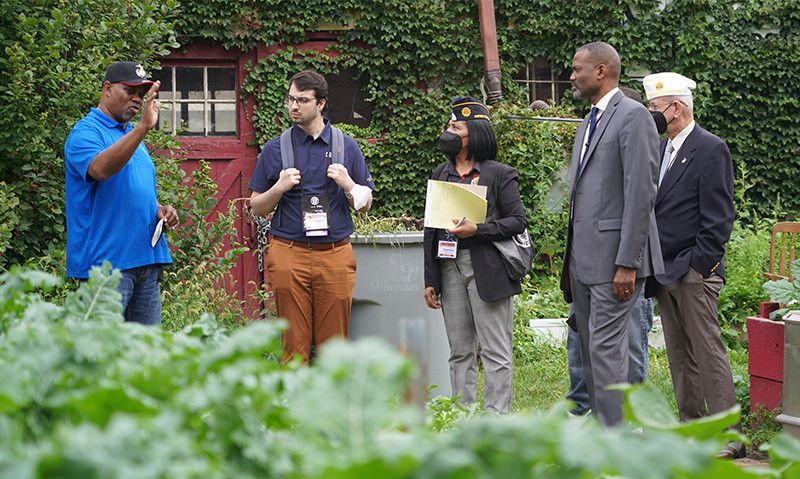
Group provided tour of veterans residence, food pantries and other facilities during national convention.
As has been a regular occurrence during American Legion national conventions, national staff and members of the Legion’s Veterans Employment & Education Commission have toured facilities geared to assist homeless veterans within convention host cities.
That was the case again this year in Milwaukee, when an American Legion contingent were provided tours and information about ways local organizations and initiatives are helping address, and assist, homelessness among the city’s and state’s veteran population.
The first stop was at Vets Place Central, an 80-resident homeless veterans residence managed by The Center for Veterans Issues (CVI), which provides housing and supportive services to help improve the quality of life for all veterans, their families, and the communities in which they live and serve.
Michael Beal, CVI’s Vice President of Programs and Services, has worked for the community-based organization since shortly after he left the U.S. Marine Corps in 1995 after being medically retired after 18 years of service.
CVI works with government entities, and corporate donors that include the Green Bay Packers, Harley-Davidson and Milwaukee Tool – which provided all the equipment for a woodburning operation on site at Vets Place Central – while also fundraising on its own.
Beal said the decades of being able to assist fellow veterans makes him feel “like I’ve come home. It’s a wonderful thing when you get up every day and know that you’re going to make a difference in somebody’s life. But more importantly, you can see that difference.”
At Vets Place Central, veterans can either use the facility as a short-term housing option for up to two years or choose to make it their permanent residence. For the short-term stays, the facility also provides access to resources to help the veteran wanting to get out on their own “help them find housing. Help them secure the first month’s rent, security deposit, moving expenses … whatever it takes to get them on their feet,” Beal said. “Those services are provided here. And the great thing is that if a veteran here gets squared away and gets back on their feet, and a year from now the bottom falls out, they can come right back here. There’s no charge, and we get right back on them again. Whatever it takes to get them and their family up and running.”
Those who choose to stay at the facility permanently, “thrive within a community of veterans,” Beal said. “All their food, the meals are provided here. Activities are provided here. If they need mental health counseling, all that is provided here. If they need transportation to get back and forth to their VA medical appointments, all that is provided here. Whatever they need to stay stably housed is all provided here.”
Two Department of Veterans Affairs social workers are on site at the facility, which also includes a game room, a TV room, laundry facilities and an outdoor vegetable garden that both residents and community youth help maintain. Some residents of the facilities perform work details within the facility.
“Everyone here is a veteran, and as a veteran we understand you have to take care of where you live,” Beal said. “There are certain work details and such. That’s just how we’re put together.”
The Legion contingent was given short tours of CVI’s Heroes Market, which serves as a food pantry for area veterans and their families, as well as the Milwaukee Soldiers Home, which CVI manages. Another stop during the tour was at the Milwaukee Homeless Veterans Initiative (MHVI), which provides everything from perishable and non-perishable food, to furniture, cleaning supplies and bicycles to veterans in need. The initiative also provides outreach and education through either participating in other entities’ events or hosting their own.
MHVI Board President Robert Webb, a U.S. Army Reserve judge advocate, said MHVI seeks to be a “one-stop shop” for veterans in need. “We don’t want to send you out the door without something.”
He added that one of the initiative’s goals is to identify “those drivers and symptoms that are causing that end result of homelessness. What I look at are those drivers that put people in crisis. Things that can put you in crisis we’re trying to level that out before you become homeless. The mission really is to get people (out of) being in crisis that will lead to homelessness.”
MHVI Executive Director Debbie Buchanan said MHVI is able to assist veterans “who can’t go to the VA or they can’t go to a (service officer) because of their (military) discharge.”
While at MHVI, the Legion group also was able to meet with Quentin Hatfield, executive director of Wisconsin Veterans Network, and Milwaukee County Veterans’ Services Director Rick Flowers. Hatfield said his programs works with more than 75 agencies throughout the state to provide services to at-risk veterans and their families.
“Generally speaking, when they come to us, they’ve been to a lot of different places … being told no,” Hatfield said. “Our job is kind of to stick our fingers in the spoke and stop that from happening and figure out what they qualify for or what we can qualify them for to plug them into services.”
- Homeless Veterans

